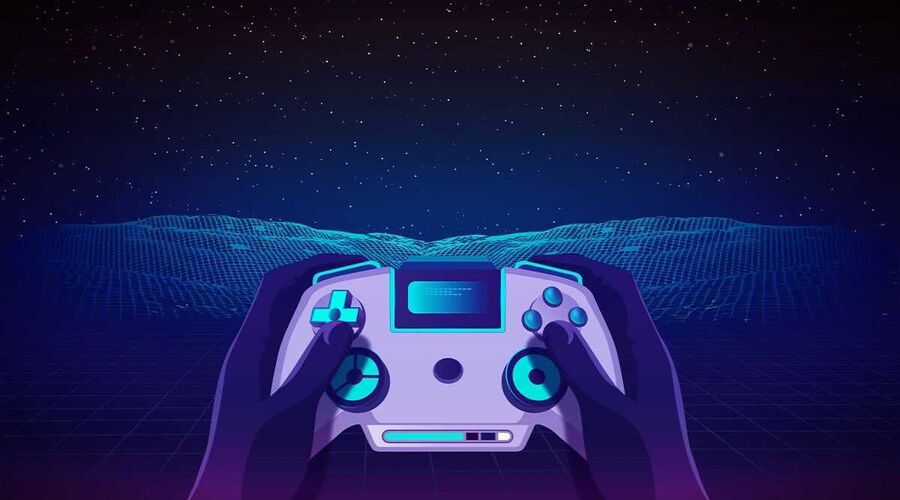

Introduction
In recent years, blockchain technology has emerged as a groundbreaking innovation with the potential to revolutionize various industries. One of the sectors that have benefited greatly from blockchain is gaming. Blockchain gaming combines the power of decentralized ledger technology with gaming, creating unique opportunities for players and developers alike. This article explores the concept of blockchain gaming, focusing specifically on its potential for cross-platform play.
Understanding Blockchain Gaming
1. What is Blockchain?
Blockchain is a distributed ledger technology that allows for the secure and transparent recording of transactions across multiple computers. It operates on a decentralized network, making it resistant to tampering and fraud. Each transaction, or block, is linked to the previous one, forming a chain of blocks, hence the name blockchain.
2. What is Blockchain Gaming?
Blockchain gaming refers to the integration of blockchain technology into video games. It introduces the concept of non-fungible tokens (NFTs) and smart contracts, enabling players to have true ownership and control over in-game assets. These assets can be bought, sold, and traded outside the game’s ecosystem, giving players a sense of ownership and value.
Advantages of Blockchain Gaming
1. Transparency and Security
Blockchain gaming offers enhanced transparency and security compared to traditional gaming models. The decentralized nature of blockchain ensures that all transactions and changes within the game are recorded on the blockchain, making them transparent and resistant to manipulation.
2. True Ownership of Assets
Unlike traditional gaming, where in-game assets are owned and controlled by the game developer, blockchain gaming allows players to have true ownership of their digital assets. The use of NFTs ensures that each asset is unique and can be bought, sold, or transferred independently of the game.
3. Interoperability and Cross-Platform Play
One of the significant advantages of blockchain gaming is its potential for cross-platform play. With blockchain, players can use their assets across different gaming platforms, breaking down the barriers of exclusive ecosystems. This interoperability enables a seamless gaming experience and expands the player community.
The Potential of Cross-Platform Play in Blockchain Gaming


1. Breaking Down Platform Barriers
Blockchain gaming has the potential to break down platform barriers that traditionally restrict players to a single gaming ecosystem. Players can use their assets in different games, regardless of the platform, fostering greater freedom and choice for gamers.
2. Seamless Gaming Experience
Cross-platform play in blockchain gaming offers a seamless experience for players. They can transfer their assets between games without losing their value, allowing for a continuous and uninterrupted gaming experience.
3. Enhanced Player Community
By enabling cross-platform play, blockchain gaming fosters a more interconnected and vibrant player community. Players can interact with a larger audience, share experiences, and collaborate on projects, enhancing social connections within the gaming ecosystem.
Challenges and Limitations
1. Scalability
One of the challenges blockchain gaming faces is scalability. As the number of players and transactions increases, blockchain networks may experience performance issues, leading to slower processing times and higher transaction fees. However, ongoing developments in blockchain technology aim to address these scalability concerns.
2. User Adoption
For blockchain gaming to reach its full potential, widespread user adoption is crucial. Educating and familiarizing players with blockchain technology and its benefits is necessary to overcome any resistance or skepticism. As awareness grows and user-friendly platforms emerge, the adoption of blockchain gaming is expected to increase.
Future Outlook of Blockchain Gaming
The future of blockchain gaming looks promising. As technology continues to evolve, scalability issues will be resolved, and user adoption will grow. The potential for cross-platform play opens up new horizons for gamers, offering more diverse and immersive experiences. With increased collaboration and innovation, blockchain gaming is set to shape the future of the gaming industry.
The Impact of Blockchain Gaming on In-Game Economies
Blockchain gaming has revolutionized the concept of in-game economies. Unlike traditional games where the game developer has full control over the economy, blockchain gaming introduces decentralized marketplaces where players can freely trade their assets. This player-driven economy empowers gamers to monetize their skills and investments, creating a more dynamic and organic gaming ecosystem.
NFTs and the Rarity Factor
Non-fungible tokens (NFTs) play a significant role in blockchain gaming. NFTs represent unique digital assets that cannot be replicated or replaced. This uniqueness adds a rarity factor to in-game items, making them more valuable and desirable. Players can own rare and exclusive items that hold both sentimental and financial value, contributing to the overall excitement and engagement within the gaming community.
Play-to-Earn Mechanics
Blockchain gaming introduces the concept of play-to-earn, where players can earn cryptocurrency or other valuable rewards by actively participating in the game. Through completing quests, achieving milestones, or contributing to the game’s ecosystem, players can be rewarded with tokens or NFTs that can be exchanged for real-world value. This innovative mechanic incentivizes gameplay and provides an avenue for players to earn while enjoying their favorite games.
Gaming and Digital Identity
In the world of blockchain gaming, players have the ability to create and manage their digital identities. These identities are tied to their blockchain wallets and hold a record of their in-game achievements, assets, and reputation. This concept of digital identity adds an extra layer of personalization and recognition, allowing players to showcase their accomplishments and establish their presence within the gaming community.
Blockchain Gaming and eSports
The emergence of blockchain gaming has also influenced the eSports industry. eSports tournaments and competitive gameplay are being integrated into blockchain games, offering players the opportunity to compete for substantial prize pools and recognition. The transparent and immutable nature of blockchain technology ensures fair competition and eliminates cheating or tampering, enhancing the integrity of eSports events.
The Role of Decentralized Governance
Blockchain gaming introduces decentralized governance mechanisms, where players can participate in the decision-making processes of the game’s development and evolution. Through voting systems or community proposals, players can have a say in the game’s updates, features, and future directions. This inclusive approach fosters a sense of ownership and engagement among the player base, creating a collaborative environment between developers and gamers.
The Potential Impact on Game Development
Blockchain gaming has the potential to reshape traditional game development practices. With the introduction of decentralized ecosystems, developers can leverage community feedback and contributions to create more immersive and player-centric games. The open-source nature of blockchain technology also encourages collaboration and innovation, leading to the emergence of unique and groundbreaking gaming experiences.
The Role of Blockchain in Preventing Cheating and Fraud
Blockchain technology has the potential to tackle the prevalent issue of cheating and fraud in gaming. By leveraging the transparency and immutability of the blockchain, game developers can create cheat-proof environments where each transaction and action is recorded and verified. This ensures fair gameplay and enhances the overall integrity of the gaming experience.
The Integration of Virtual Reality (VR) and Augmented Reality (AR) in Blockchain Gaming
The combination of blockchain gaming with virtual reality (VR) and augmented reality (AR) technologies opens up exciting possibilities. VR and AR can provide immersive and interactive experiences, enhancing the gameplay and blurring the boundaries between the virtual and real worlds. Blockchain’s decentralized nature can enable secure ownership and trading of virtual reality assets, creating a seamless integration of these emerging technologies.
Environmental Sustainability and Blockchain Gaming
As concerns about the environmental impact of traditional gaming grow, blockchain gaming offers a more sustainable alternative. Blockchain technology consumes significantly less energy compared to traditional gaming systems, reducing the carbon footprint associated with gameplay. This eco-friendly aspect of blockchain gaming aligns with the increasing focus on environmental sustainability in various industries.
Intellectual Property Protection in Blockchain Gaming
Blockchain technology provides a robust solution for protecting intellectual property (IP) in gaming. Through the use of smart contracts and NFTs, game developers and creators can establish verifiable ownership and copyright protection for their digital assets. This ensures that their creative works are protected from unauthorized replication or use, promoting a fair and secure gaming ecosystem.
The Rise of Playable Assets and Blockchain Gaming
In blockchain gaming, assets can take on a whole new dimension by being not only tradable but also playable across different games. Playable assets are unique in that they can be utilized in multiple gaming experiences, enhancing the versatility and value of these assets. This interoperability fosters a dynamic and interconnected gaming environment, offering players diverse and customizable gameplay options.
The Emergence of Blockchain Gaming Communities and Social Interaction
Blockchain gaming has sparked the growth of vibrant and passionate communities. Players are brought together by shared interests, investment opportunities, and collaborative gameplay experiences. These communities foster social interaction, where players can connect, share knowledge, and form friendships based on their mutual love for blockchain gaming. The sense of community adds an extra layer of enjoyment and engagement to the gaming experience.
The Intersection of DeFi and Blockchain Gaming
The decentralized finance (DeFi) movement has found its way into the world of blockchain gaming. DeFi protocols allow players to lend, borrow, and earn interest on their in-game assets. This integration of DeFi with blockchain gaming introduces new financial opportunities within the gaming ecosystem, allowing players to generate income and create additional value from their gaming activities.
Conclusion
Blockchain gaming represents a new era for the gaming industry, combining the benefits of blockchain technology with interactive gameplay. The potential for cross-platform play breaks down barriers and creates a more inclusive and interconnected gaming environment. As blockchain gaming continues to evolve, players can look forward to enhanced transparency, true ownership of assets, and a seamless gaming experience across multiple platforms.


I have been featured in numerous publications, both online and offline, and am a regular speaker at industry events. I am also the founder of Crypto University, an online educational platform that helps people learn about cryptocurrencies and blockchain technology. In addition to my writing and teaching career, I am also an active investor in the cryptocurrency space. I have made investments in some of the leading projects in the space, and my portfolio has outperformed the market by a wide margin.
